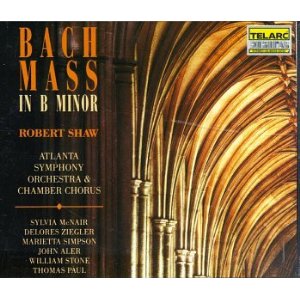Music |
Bach: Mass in B minor
By
Published: Mar 13, 2022
Category:
Classical
Bach’s B Minor Mass was never played in his lifetime, but once it was discovered a century or so later, it was an object of awe. Beethoven kept a picture of Bach on his desk. Mozart discovered him late, but made up for it with the intensity of his admiration. And Haydn made sure to get his own copy of the score.
And musicologists? No one I’ve read has a dissenting opinion: The Bach Mass in B Minor is the most exalted example of religious devotion in all of Western music. Period.
As we have endlessly heard, Bach’s innate talent was immense. As a composer, he could, and did, produce a cantata a week. As a musician, it was said that he could play an organ better with his feet than others could with their hands.
Beyond talent, though, there are two circumstances that have helped an amateur like me develop a deeper appreciation of this piece.
First is that Bach did not — like, say, Mozart writing the Requiem — create the Mass in a single, unified period of composition. It’s a gathering of pieces he had written over the years, and a shrewd one at that, exploring every avenue of polyphony.
The other is that Bach completed the Mass when he was totally blind, with death looming. It’s cheesy to consider a piece of music as a job application, but you can’t help thinking that Bach was consciously writing a piece that God would accept as his final offering. Perhaps that is why Bach, though a Lutheran, wrote a full formal Catholic mass here — music that could never be performed in his own church.
I’ve been listening to the Robert Shaw recording for years. Shaw conducted the piece hundreds of times; it was in his blood by the time he recorded it. [To buy the CD from Amazon, click here. ]
An Amazon reviewer has a lovely story about Shaw and the Mass:
In his authorized biography, "Dear People," written by Joseph Musselman (a former Shaw chorister who later achieved his own musical reknown as a choral music practitioner), there is a wealth of anecdotes about how his performances of this work could reduce folks to tears, from Alaskan Aleuts to college kids everywhere to Soviet apparatchiks at the height of the Cold War. One of the most telling anecdotes regarding his mastery, as well as his unassuming modesty in the face of it all, occurred after a performance that must have really jelled. Following the concluding "Dona Nobis Pacem" of the Mass, Shaw left the podium and darted behind the curtain, awaiting the applause. He waited, and waited some more. Finally, not understanding why it was that the applause never arrived, he poked his head out from behind the curtain, only to find both the audience and the musicians facing each other and bawling their eyes out from what must have been a rendering of "Dona Nobis Pacem" for all time, in terms of its ability to open these tear-duct floodgates.
Shaw’s version is not on YouTube, but these samples of the Mass are.
Convincing, yes?


